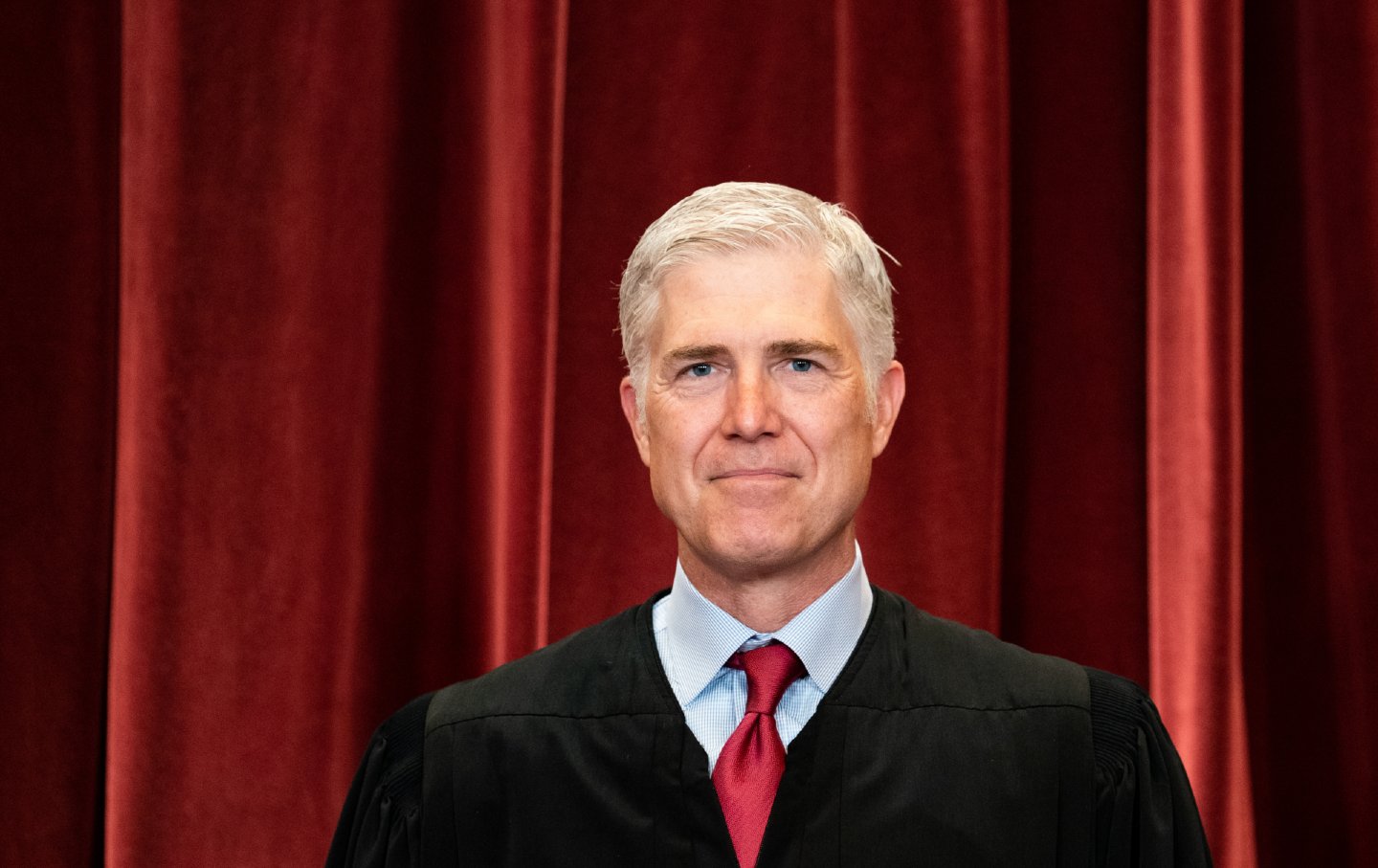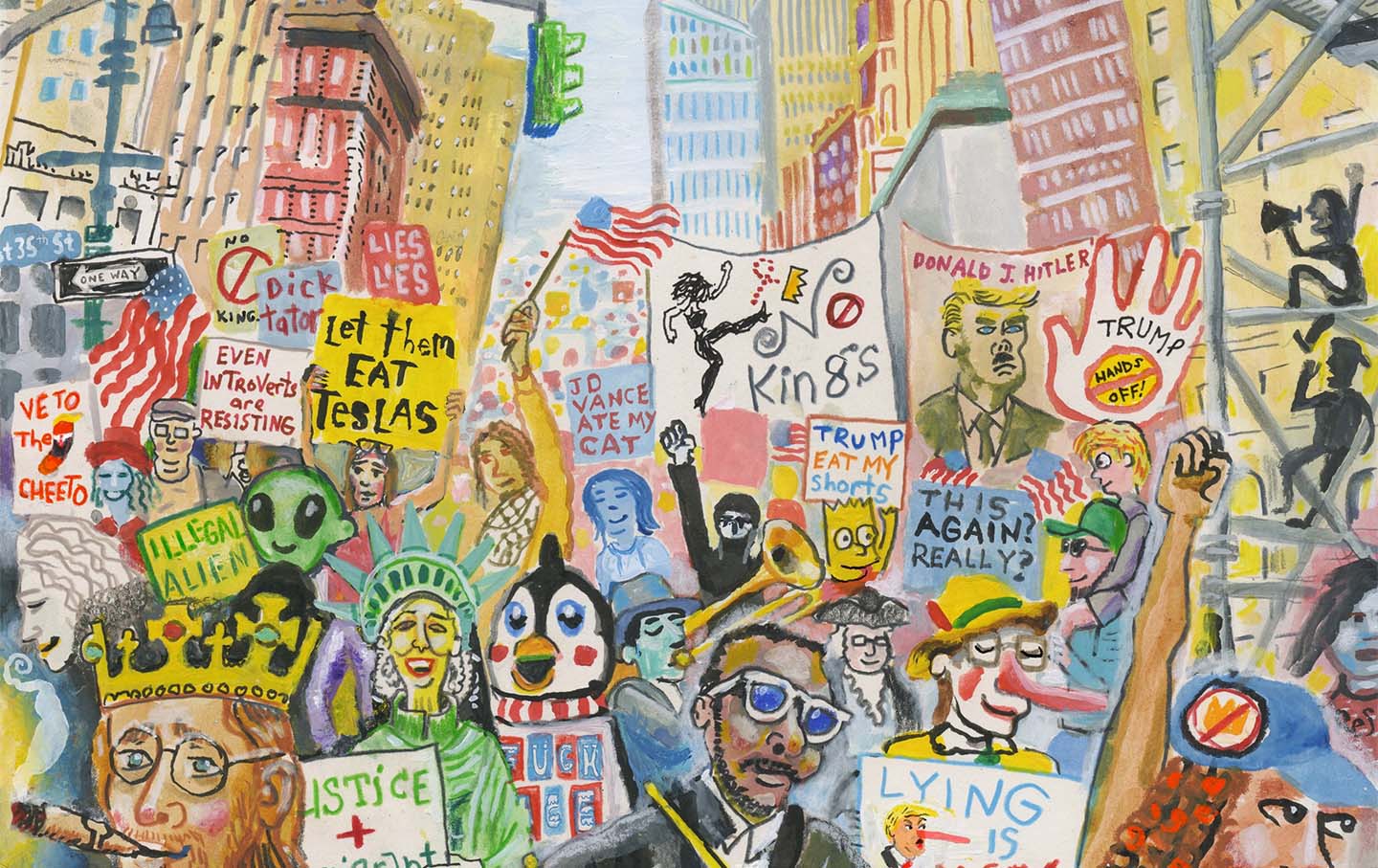How We Can Defend Ourselves in the New Trump Era
The labor organizer Bill Fletcher says that, to protect our constitutional democracy, “the union movement needs to become an anti-fascist movement.”

Bill Fletcher Jr.
(Franklin & Marshall College)
Bill Fletcher Jr. is one of the most revered political organizers of the last 40 years and a Nation editorial board member. He’s been an activist since his teen years and joined the labor movement after college when he worked as a welder in a shipyard. He has worked for and with numerous unions and was the founder of the Black Radical Congress. Fletcher is also the former president of TransAfrica Forum and the writer of several books of both nonfiction and fiction. I spoke to him about how we can defend ourselves during the Trump Restoration.
—Dave Zirin
Dave Zirin: You have worked with and organized immigrant labor for many years. Trump says his intention is to deport 10 to 20 million undocumented workers—depending on the speech that day. The sheer amount of violence and number of families that would be destroyed is unfathomable. The economic costs would also be catastrophic. Is this real? If so, how do you even begin to build resistance to that?
Bill Fletcher Jr.: We should take everything that he’s raised seriously. That’s where I want to begin, because I think among the left, as well as Trump supporters, a lot of people didn’t take him seriously. They kept saying, “Oh, he’s never going to do that. It’s just a campaign thing.” And I think, as the saying goes, “When someone tells you who they are, believe them the first time.” So I take it very seriously.
In the mid-1930s, there was a major repatriation of Chicano and Mexicano citizens of the United States, and they were basically forced to leave. The numbers range from 1 to 2 million people. And many of these people left “voluntarily,” because they were basically forced out of their homes, they were not given jobs, and so on. And the Depression was being blamed on them. So it has already happened. It could definitely happen again. Now, this time, there’s a number of different possibilities that include a combination of legal and extralegal violence. We could have a strengthening of ICE. We could have perhaps a federalizing of the National Guard for a number of things. And we could have vigilantes assist in the repatriation.
The second thing that we’ve got to keep in mind is that the discussions, particularly in the last couple of months, about moving against immigrants have not been limited to the undocumented. They’ve been using a term that European fascists have been using: “remigration.” They’re talking about ethnic cleansing. They’re talking about denaturalizing naturalized citizens. I doubt that they’re talking about moving against Mrs. Trump, but they’re talking about denaturalizing people. So, there’s a possibility that there could be legal and extralegal violence that’s used to carry this out. Now, while it’s always possible that this is just a blowhard speaking, we shouldn’t assume that. One of the things we need to do very quickly is start building legal protection, as well as organizations, to support immigrants, but we also need to contemplate massive action. For instance, on May Day 2006, there was the Day Without Immigrants, as you may remember. And that was eye-opening for many people. We may need to plan something very much along those lines. We’ll need the union movement to throw down a massive “stay away” on this that is at least a day and maybe more to make the point of the relationship of immigrants to the larger society. Now, when it comes to immigrants, one way where things get complicated is that the capitalist class is very divided on the issue of immigrants. There are many in the capitalist class that absolutely want to ensure that migration continues, both legal as well as undocumented migration, because of their workforce needs. This could complicate matters for Trump, but we just don’t know.
DZ: I want to try to put some meat on the bone of what you just said. Take Langley Park, right in Prince George’s County. It is one of the most densely populated areas of Salvadoran immigrants. For the people of Langley Park and people around Langley Park organizations like Casa de Maryland, what’s step one in terms of defending the community from out-of-state police officers looking to, as the fascists and Trumpists put it, “remigrate” them?
BF: I think every neighborhood with a substantial number of immigrants is going to need the equivalent of a neighborhood watch, and people are going to have to be on the lookout for both suspicious legal or extralegal forces that may be coming into the community. And also be prepared to mobilize, much like the unemployed councils did in the 1930s when people were being evicted from their homes. The unemployed councils would show up and they’d move people’s belongings back into the house after they were evicted. We’re going to need that level of mass organization. We also are going to need to have legal teams that people can call as soon as they know that something is happening. And one of the things we should assume that would be needed is to essentially gum up the courts. You’ve got to fill the courts with lawsuits.
DZ: Let’s take it to labor. You’re so experienced in this field. What do you expect from organized labor in the months ahead if anything?
BF: I expect three things. One thing is that some people will go radio silent, and you will hear nothing from them. A second thing will be the “cover your ass” element. These will be the people that will do something much like what happened after January 6 with Congress, where various congressional people ran to Trump to try to play nice. You’ll have some leaders that will try to cut their own deal with Trump or the administration to make sure that their sector and their union does not get touched. And the third thing will be those who will resist. And I think that many of those will be the usual suspects. That is, there are unions that have fought hard around immigration, immigrants, attacks on immigrants like UNITE HERE, the Service Employees International Union, the Painters, and a few others that have been out there fighting for, organizing, and supporting migrants. So you’ll have a split. I think it’s going to be very hard for the National AFL-CIO to build the right kind of consensus. But here’s the punch line: The union movement needs to become an anti-fascist movement, and the idea that anti-fascism is partisan is irrelevant and absurd.
There is a particular threat to constitutional democracy. And in that situation, there are only two sides. There are no three sides in this one. And the union movement needs to take up the banner of anti-fascism. And that will mean that there will be some unions and some union leaders that are going to try to take a pass. But that’s what we have to do. One of the projects I’m involved in is something called Standing for Democracy. One of our objectives is to fight to make the union movement an anti-fascist movement. I think all good progressives and leftists that are active in the trade union movement need to take up that banner. There is a global alignment of unions and union federations that’s emerged over the last 18 months that’s quite explicitly anti-fascist. We need to be part of that.
DZ: You mentioned the unemployed councils earlier, and I’m really glad you brought history to bear on this, because many feel like we’ve never faced anything like this before. In one respect, they’re, of course, correct. But this also is not new, right? Social justice fighters of the past, particularly in marginalized communities, have faced conditions similar to this, have they not?
BF: Yes, we have faced this in the past. Speaking from my own personal experience, in 2014, I and some other people started really raising the hell about the danger of right-wing populism. There were groups that have been raising this for years, there’s the Political Research Associates and the Anti-Klan Network and so on. But in my own experience, I really started to see the danger, and I was confronted continuously with denial: “Oh, you’re exaggerating things. The real danger is neoliberalism,” and “You’re distracting people.”
And then Trump got elected. And when Trump got elected, another weird thing happened: Some people on the progressive side started to believe what Trump was saying. Things like there being no Russian interference in the election or that Trump was a passing phenomenon, and that the real problem were people like the Clintons and other centrist Democrats. These were people who, years earlier when the Tea Party was rising, denied that the Tea Party was actually a movement. They talked about how it was an astroturf phenomenon; it was all created by these rich people and there was no mass base to it. And people were ignoring that there was this monster from the deep that was emerging. This was very, very real. Then all of a sudden in the last year, people started talking very widely about the fascist threat. And I was glad to hear it, but it was like, “Hey, where the hell have you been for the last period of time?”
The danger we face right now is that there’s going to be paralysis. People are going to feel very overwhelmed by the threat we’re facing, and many people are not going to know what to do. They’re going to be trapped in despair, and we can’t afford that
Right now, what we need to be realizing is that we got our asses kicked, and now we need to build a counteroffensive. And it’s not going to be easy. We have seen the monster. The monster from centuries of racial settler-colonialism, the monster from centuries of misogyny has emerged from the deep. It has swung its tentacles. It has been knocking the mess out of us. It is here. It is not imaginary. And so, we’ve got to figure out what to do. That’s more of what people like you and I and others need to be talking about in the coming weeks. Not rushing to do stuff like having a demonstration just to have a demonstration, but to develop a real strategy of a counteroffensive. How do we take these folks on? Where did we win and lose in this last election cycle, and what conclusions do we draw from that? Many of these victories by the Republicans were very slim, so we shouldn’t just throw ourselves on a knife and commit seppuku.
I think there’s going to be people that blame this all on the economy, and I’ve seen it already. They’re going to be saying, “If the Democrats had spoken more about the economy, this wouldn’t have happened,” leaving aside a very interesting fact that a lot of people have ignored, which is that even in places where the results of Biden’s economic policies were working, [this] did not necessarily result in people moving away from MAGA. Because we’re not just dealing with an economic phenomenon. We are dealing with revanchism: reaction and grievance turned up to a scale unimaginable in the recent past.
DZ: No, it’s a great point. And anybody who sees this purely in economic terms is not getting the full picture of what’s happening. There is a revanchist mass movement in this country that in many respects has created its own reality. Yes, for many it was about feeling hardship and inflation during the Biden years. But it’s also about a mass of the population choosing to accept the alternative reality that Trump has constructed. Because as I’ve heard you say many times, “A key difference between the left and right is that the left has to tell the truth and the right, to survive, must embrace lies” like Trump’s blood libel of immigrants and saying that if you don’t elect him we’ll have a global recession, which is exactly what he said in 2020.
You mentioned the unemployed councils. The person who I learned about them from is already posting online that he’s getting his passport renewed. What do you say to the people who right now feel like they have to live anywhere but here? We both know that there are trans people and pregnant people who may have to leave to get care. But what about everyone else filling out travel visas?
BF: I understand that feeling. My sister has said to me that she will help me get out, because she’s really afraid for my life. I think that her fear is entirely realistic. We are walking into very unknown territory. But I would say to people that what we need right now is to build organization. As long as we’re able to do that, we should do that and not disappear. Now, if someone has a medical issue or a psychological issue that makes it impossible for them to be active, I get that. There’s going to be some people that are going to say, even at my age, which is 70, “Bill, you should just go to South Africa. You love South Africa, go there. Retire there.” And I get that; I’m just not ready to do it now. And I think that we need to, to the extent possible, build the counterattack. I remain stupidly optimistic that we can actually do it, but it’s going to necessitate a broad front. And I’ll tell you, for me personally, I’ve had it with purists. We have to be willing to unite broadly. I’m interested in working with people who are interested in winning, and I think we can.
Correction: A previous version of this interview misidentified the organization Bill Fletcher helped found.
Disobey authoritarians, support The Nation
Over the past year you’ve read Nation writers like Elie Mystal, Kaveh Akbar, John Nichols, Joan Walsh, Bryce Covert, Dave Zirin, Jeet Heer, Michael T. Klare, Katha Pollitt, Amy Littlefield, Gregg Gonsalves, and Sasha Abramsky take on the Trump family’s corruption, set the record straight about Robert F. Kennedy Jr.’s catastrophic Make America Healthy Again movement, survey the fallout and human cost of the DOGE wrecking ball, anticipate the Supreme Court’s dangerous antidemocratic rulings, and amplify successful tactics of resistance on the streets and in Congress.
We publish these stories because when members of our communities are being abducted, household debt is climbing, and AI data centers are causing water and electricity shortages, we have a duty as journalists to do all we can to inform the public.
In 2026, our aim is to do more than ever before—but we need your support to make that happen.
Through December 31, a generous donor will match all donations up to $75,000. That means that your contribution will be doubled, dollar for dollar. If we hit the full match, we’ll be starting 2026 with $150,000 to invest in the stories that impact real people’s lives—the kinds of stories that billionaire-owned, corporate-backed outlets aren’t covering.
With your support, our team will publish major stories that the president and his allies won’t want you to read. We’ll cover the emerging military-tech industrial complex and matters of war, peace, and surveillance, as well as the affordability crisis, hunger, housing, healthcare, the environment, attacks on reproductive rights, and much more. At the same time, we’ll imagine alternatives to Trumpian rule and uplift efforts to create a better world, here and now.
While your gift has twice the impact, I’m asking you to support The Nation with a donation today. You’ll empower the journalists, editors, and fact-checkers best equipped to hold this authoritarian administration to account.
I hope you won’t miss this moment—donate to The Nation today.
Onward,
Katrina vanden Heuvel
Editor and publisher, The Nation








